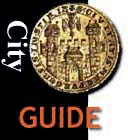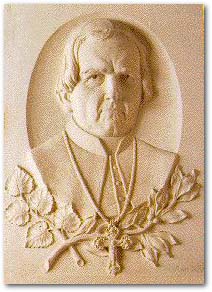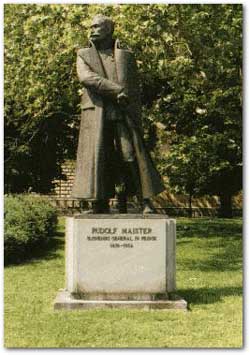

![]() Maribor entered
Slovene literary history in 1760 with a manuscript of a German-Slovene
dictionary by the Capuchin Ivan Anton Apostel,
who was born in Maribor. (The manuscript is kept in the Maribor
University Library.) Later, an intellectual,
spiritual, and political awakening in Slovenia spread
among Maribor high school (Gymnasium) students, with the
result that in 1846 the students published the first
Slovene college journal "Sprotuletna vijolica".
In 1864 it was the Gymnasium students again who published
the almanac "Lada" thus offering the
first published translation of Shakespeare in
Slovene.
Maribor entered
Slovene literary history in 1760 with a manuscript of a German-Slovene
dictionary by the Capuchin Ivan Anton Apostel,
who was born in Maribor. (The manuscript is kept in the Maribor
University Library.) Later, an intellectual,
spiritual, and political awakening in Slovenia spread
among Maribor high school (Gymnasium) students, with the
result that in 1846 the students published the first
Slovene college journal "Sprotuletna vijolica".
In 1864 it was the Gymnasium students again who published
the almanac "Lada" thus offering the
first published translation of Shakespeare in
Slovene.
 For popular
Catholic literature an important event was the transfer
of the seat of the diocese to Maribor. Here Bishop Anton
Martin Slomsek continued to publish the educational
series "Drobtinice" ("The
Breadcrumbs"). Devotional Slovene literature,
however had been issued in Maribor earlier than that in
fact right after 1795 when the first printing press was
set up. Secular literature was given a new impetus with
the arrival in Maribor of the writer Josip Jurcic. He
devoted himself to journalism and literature and started
the literary review "Slovenski glasnik"
("The Slovene Nation"). During the years
1872-1878 the journal "Zora" ("The
Dawn") was published; for two years it was under
the editorship of Davorin Trstenjak in turn
followed by Janko Pajk.
For popular
Catholic literature an important event was the transfer
of the seat of the diocese to Maribor. Here Bishop Anton
Martin Slomsek continued to publish the educational
series "Drobtinice" ("The
Breadcrumbs"). Devotional Slovene literature,
however had been issued in Maribor earlier than that in
fact right after 1795 when the first printing press was
set up. Secular literature was given a new impetus with
the arrival in Maribor of the writer Josip Jurcic. He
devoted himself to journalism and literature and started
the literary review "Slovenski glasnik"
("The Slovene Nation"). During the years
1872-1878 the journal "Zora" ("The
Dawn") was published; for two years it was under
the editorship of Davorin Trstenjak in turn
followed by Janko Pajk.
![]() Slovene literary creativity in Maribor then
turned back to theology . Among the contributors to its
handwritten journal "Lipica" ("The
Small Lime Tree") were Anton Askerc and Franc
Ksaver Mesko.
Slovene literary creativity in Maribor then
turned back to theology . Among the contributors to its
handwritten journal "Lipica" ("The
Small Lime Tree") were Anton Askerc and Franc
Ksaver Mesko.
![]() Before World War I, a new generation of writers
had grown up among the high school students, including
the poet of the Pohorje mountain Janko Glazer, and
Stanko Majcen, the lyricist, novelist, and
dramatist. Between the two wars the
Before World War I, a new generation of writers
had grown up among the high school students, including
the poet of the Pohorje mountain Janko Glazer, and
Stanko Majcen, the lyricist, novelist, and
dramatist. Between the two wars the  number of writers in Maribor increased. Among
them were the poets General Rudolf Maister, Janko
Samec, Anton Tanc, Branko Rudolf, and Vida Taufer;
the novelists Bratko Kreft, Maks Snuderl, Josip
Kostanjevec, lvo Sorli, Ivan Dornik, Ivan Potrc; and
the dramatists Rudolf Golouh, Radivoj Rehar, and Tone
Cufar. Renowned among essayists, journalists, and
critics were Franc Susnik, Vladimir Kralj, and Bogo
Teply. In addition to the review "Zrnje"
("The Seeds"), published shortly after
World War I, Maribor had the literary and cultural review
"Piramida" ("The Pyramid"). It
was published for a year during 1936-1937. However, it
was only its successor the review "Obzorja"
("The Horizons") that took hold and
continued to be published right up to the German
occupation.
number of writers in Maribor increased. Among
them were the poets General Rudolf Maister, Janko
Samec, Anton Tanc, Branko Rudolf, and Vida Taufer;
the novelists Bratko Kreft, Maks Snuderl, Josip
Kostanjevec, lvo Sorli, Ivan Dornik, Ivan Potrc; and
the dramatists Rudolf Golouh, Radivoj Rehar, and Tone
Cufar. Renowned among essayists, journalists, and
critics were Franc Susnik, Vladimir Kralj, and Bogo
Teply. In addition to the review "Zrnje"
("The Seeds"), published shortly after
World War I, Maribor had the literary and cultural review
"Piramida" ("The Pyramid"). It
was published for a year during 1936-1937. However, it
was only its successor the review "Obzorja"
("The Horizons") that took hold and
continued to be published right up to the German
occupation.
![]() After the war more such journals enhanced the
literary scene. In 1948 the review "Nova
Obzorja" ("The New Horizons") was
established, to be replaced in 1965 by "Dialogi"
("The Dialogue"). Younger writers published
for a short while "Svit" ("The
Daybreak", 1952 1954); a later younger
generation joined the Maribor student journal "Katedra"
("The Chair"). The number of writers and
poets living in Maribor greatly increased, so that a
branch of The Slovene Writers'
Association was formed. Preparations for the annual
Statenberg literary meetings generally create much
interest in the cultural life of Slovenia.
After the war more such journals enhanced the
literary scene. In 1948 the review "Nova
Obzorja" ("The New Horizons") was
established, to be replaced in 1965 by "Dialogi"
("The Dialogue"). Younger writers published
for a short while "Svit" ("The
Daybreak", 1952 1954); a later younger
generation joined the Maribor student journal "Katedra"
("The Chair"). The number of writers and
poets living in Maribor greatly increased, so that a
branch of The Slovene Writers'
Association was formed. Preparations for the annual
Statenberg literary meetings generally create much
interest in the cultural life of Slovenia.
![]() The Maribor publishing house Obzorja
("The Horizons") has been most receptive to
Slovene writers. From its inception in 1950, until the
end of 1989, it has published no fewel than 3223 literary
works. Needless to say, it has always encouraged the
publication of contemporary Slovene writing. Among German
writers in Maribor, one should mention Dr Rudolf
Gustav Puff, an historian of Maribor, the dramatist Max
Mell, who was awarded the prize the "Grillparzer
Ring", the German nationalistic poet Ottokar
Kernstock, and the novelist and essayist Alfred
Maderno. Among literary works where the locale is set
in Maribor, are the following: Josip Vosnjak's
Navzgor in navzdol ("Up and Down") , Ljudevit
Pivko's Ribicev Jurka ("Ribic's Jurka"). Makso
Snuderl's Osvobojene meje ("The Liberated
Frontiers"); Bratko Kreft's Clovek mrtvaskih
lobanj ("The Man of Dead Skulls"); Filip
Kalan's Pustolovci ("'The Adventurers"); Drago
Vresnik's Dan v oktobru ("A Day in October")
and Praznina ('Emptiness"); Smiljan Rozman's
Nekdo ("Somebody"), Mesto ("The
City"), and Rusevine ("The Ruins"); Anton
Ingolic's Stavka ("The Strike"); Nada
Gaborovic's Ne samo jaz ("Not Just Me"),
Razdalje ("Distances"), and Malahorna; Janez
Svajncer's Karneval ("The Carnival') and Prelom
('The Rupture") , Joze Hudales's General ("The
General"); Drago Jancar's Severni sij
("The Northern Lights"); Zlata Vokac's
Marpurgi ("The Marpurgians"); Tone
Partljic's Pepsi ali provincialni don Juan
("Pepsi or The Provincial Don Juan"). Janez
J. Svajncer's Ministrova sprejemnica ("The
Minister"s Reception Room"); Ludwig
Mahnert's Die Wildenrainer; Karl Bienenstein's
Garender Wein and Heinz Brunner's Brucke uber die
Drau.
The Maribor publishing house Obzorja
("The Horizons") has been most receptive to
Slovene writers. From its inception in 1950, until the
end of 1989, it has published no fewel than 3223 literary
works. Needless to say, it has always encouraged the
publication of contemporary Slovene writing. Among German
writers in Maribor, one should mention Dr Rudolf
Gustav Puff, an historian of Maribor, the dramatist Max
Mell, who was awarded the prize the "Grillparzer
Ring", the German nationalistic poet Ottokar
Kernstock, and the novelist and essayist Alfred
Maderno. Among literary works where the locale is set
in Maribor, are the following: Josip Vosnjak's
Navzgor in navzdol ("Up and Down") , Ljudevit
Pivko's Ribicev Jurka ("Ribic's Jurka"). Makso
Snuderl's Osvobojene meje ("The Liberated
Frontiers"); Bratko Kreft's Clovek mrtvaskih
lobanj ("The Man of Dead Skulls"); Filip
Kalan's Pustolovci ("'The Adventurers"); Drago
Vresnik's Dan v oktobru ("A Day in October")
and Praznina ('Emptiness"); Smiljan Rozman's
Nekdo ("Somebody"), Mesto ("The
City"), and Rusevine ("The Ruins"); Anton
Ingolic's Stavka ("The Strike"); Nada
Gaborovic's Ne samo jaz ("Not Just Me"),
Razdalje ("Distances"), and Malahorna; Janez
Svajncer's Karneval ("The Carnival') and Prelom
('The Rupture") , Joze Hudales's General ("The
General"); Drago Jancar's Severni sij
("The Northern Lights"); Zlata Vokac's
Marpurgi ("The Marpurgians"); Tone
Partljic's Pepsi ali provincialni don Juan
("Pepsi or The Provincial Don Juan"). Janez
J. Svajncer's Ministrova sprejemnica ("The
Minister"s Reception Room"); Ludwig
Mahnert's Die Wildenrainer; Karl Bienenstein's
Garender Wein and Heinz Brunner's Brucke uber die
Drau.